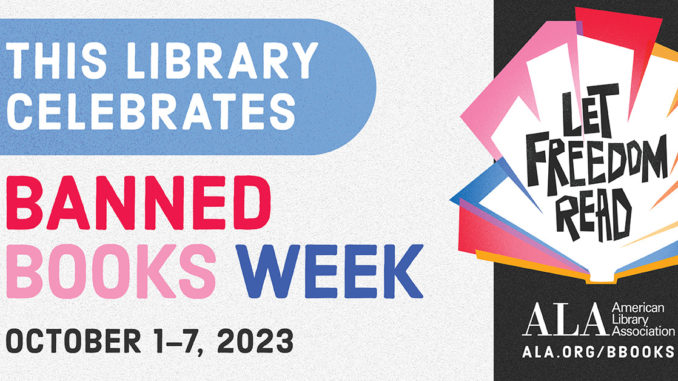
This year, Banned Books Week is October 1st – October 7th. The Algonquin Library has a couple special things planned in September & October to celebrate the 1st Amendment, which can be seen at the end of this post. If you have witnessed book challenges, removals, or general censorship, please report it to the American Library Association’s Office of Intellectual Freedom. You do not need to be a librarian, teacher, or a professional adult — an anonymous student is just fine. Mostly, they just want to get an accurate portrayal of censorship in the United States in any given year. A lot of times these things are done in secret because those in charge know it is shameful.
Miss Holly’s Take on Frequently Banned Teen Books
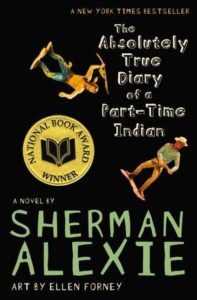 The Absolutely True Diary of a Part Time Indian by Sherman Alexie
The Absolutely True Diary of a Part Time Indian by Sherman Alexie
Sherman Alexie was canceled in 2018 during the #MeToo movement that started in the film industry and eventually spread to book publishing. The American Indians in Children’s Literature has a good description of what happened with that here. Does a problematic author make their books irrelevant just by being a flawed person? I don’t think so. The Absolutely True Diary of a Part Time Indian might have some mature content, but so do the childhoods of many living, breathing American Indians. Experiencing childhood trauma can result in damaged adults. Since this book is largely autobiographical, I think gives a real-life example of why children deserve real childhoods rather than constantly witnessing violence, abuse, and addiction.
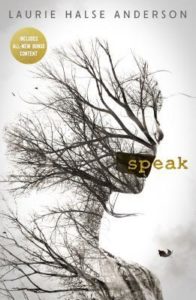 Speak by Laurie Halse Anderson
Speak by Laurie Halse Anderson
Speak is a story of a fourteen year old girl who gets raped by a classmate at a stereotypical teen party. So, you can probably guess why people don’t like it. Some people view this rape story as “soft-core pornography,” “biased against male students,” or “glorifying pre-martial sex” (Source here). Those criticisms say more about the person complaining than the book itself. When I was a student at Crystal Lake South High School, this was assigned reading for all the Freshman English classes. When it was first published in 1999, there were not too many books for teenagers about sexual assault-induced PTSD. Speak was the seminal piece to start a conversation about consent with young adults. Otherwise, that conversation ends up more like the health class scene in Mean Girls (“Don’t have sex because you WILL get pregnant and DIE.”).
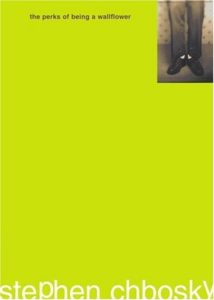 The Perks of Being a Wallflower by Stephen Chbosky
The Perks of Being a Wallflower by Stephen Chbosky
This coming-of-age novel is another in which the author writes themselves into the main character. Chbosky said he was struggling with his own identity while writing it. The Perks of Being a Wallflower touches on issues of drug use, LGBTQIA+ identities, sexual abuse within a family, and romantic relationships between teenagers. From the perspective of a parent who will always view their child as their tiny little baby, those issues all seem rather mature. From the perspective of a teen librarian who regularly visits your high schools, it’s plain to me that those complex issues are facing you or your friends daily. 10-year-olds don’t just magically poof into 20-year-olds without any blood, sweat, or tears. There are many twists and turns along the way to adulthood and sometimes books can help you get there.
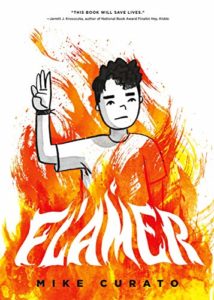 Flamer by Mike Curato
Flamer by Mike Curato
This is the story of a devout, religious boy who begins to suspect that he might be gay. We learn about his inner conflict between maybe being gay and being told that it is wrong & bad. He loves God and doesn’t want to disappoint him. He is willing to do anything to be straight, including self-harm. The main reasons this one gets challenged is for some weird interactions between all the [presumably straight] boys at their sleepaway Boy Scout summer camp. I think in many instances, adults just do not remember the reality of being a teenager. Show me one adult without at least one embarrassingly stupid story from their younger days. Or better yet: show me one adult man who never made one crude sex joke as a teen boy. I will wait. At the end of the day, we are all human beings.
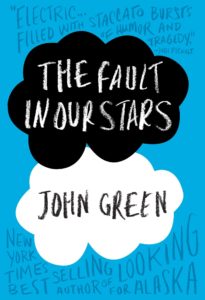 The Fault in Our Stars by John Green
The Fault in Our Stars by John Green
John Green is not new to censorship, just check out this Vanity Fair article from 2014 about The Fault in Our Stars. Back then, one parent decided that the concepts of cancer & death was too mature for middle school students. Nowadays, a public library in Green’s home state of Indiana removed The Fault in Our Stars from its Teen/YA collection and placed it in Adult Fiction. If you are interested to know what other teen fiction has been placed into adult fiction at that library, the list begins on page 119 of this document here. It certainly is an interesting choice. In my brain, I foresee Indiana teenagers browsing adult fiction for their John Green books and running into adult books with content that is far more mature than The Fault in Our Stars. I’m not sure how forcing kids into the adult section is protective & good, but choices were made.
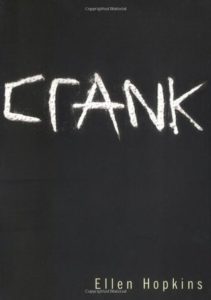 Crank by Ellen Hopkins
Crank by Ellen Hopkins
This book is autobiographical in that Ellen Hopkins’ daughter ran away and got into drugs. Several years ago, I was a regular volunteer for the Crystal Lake Teen Center. All the kids knew I was a librarian so they asked me to run a book club for them and they told me the book they wanted to read was Crank. Okay. I prepared a whole book discussion for them and did we talk about the book during book club? No, they talked at me about drugs, the prevalence of drugs in their high schools, and classmates being arrested after drug-sniffing dogs visited the school. Just last year I attended an overdose funeral for the father of a Jacobs High School student. The war on drugs & the opioid epidemic affect kids a lot. We need to talk about it because the stakes are literally life and death.
Banned Books Week Events
LibBox Theme Box: Banned/Challenged Books (Algonquin cardholders only: Algonquin cards start with 2148800)
September — Entire Month
This month, in anticipation of Banned Books Week, which will take place October 1-7, we are exercising our freedom to read by celebrating banned/challenged books! Banned Books Week is a week every year when libraries encourage patrons to exercise their freedom to read by reading commonly banned/challenged books.
Book Challenges on the Rise: Support Your Freedom to Read
Monday, October 2nd from 7-8pm (virtual)
“Freedom to Read” is a fundamental American right: your right to choose the ideas, information, and cultural experiences that are right for you and your family. That right is guaranteed by the First Amendment of the United States Constitution. And your public library supports that right by providing free and open access to all. Book bans infringe on that right. When people demand that libraries remove books, they deny you and others the right to choose. Those demands are happening at an unprecedented rate. The American Library Association (ALA) reports more book challenges in 2022 than any previous year. This webinar will be moderated by syndicated columnist Heidi Stevens and feature a panel of experts:
- Alexi Giannoulias, Illinois Secretary of State and State Librarian
- Monica Harris, Executive Director, Reaching Across Illinois Library System
- Jasmine Warga, author of challenged books
- Jarrett Dapier, author of challenged picture books
Teen Banned Books Club
Thursday, October 6th from 4-5pm (in-person)
Celebrate your freedom to read during Banned Books Week! Read any banned book and come prepared to talk about the book and free speech. Snacks and drinks will be available. Need book suggestions? Check out these annual top ten lists from the American Library Association.
